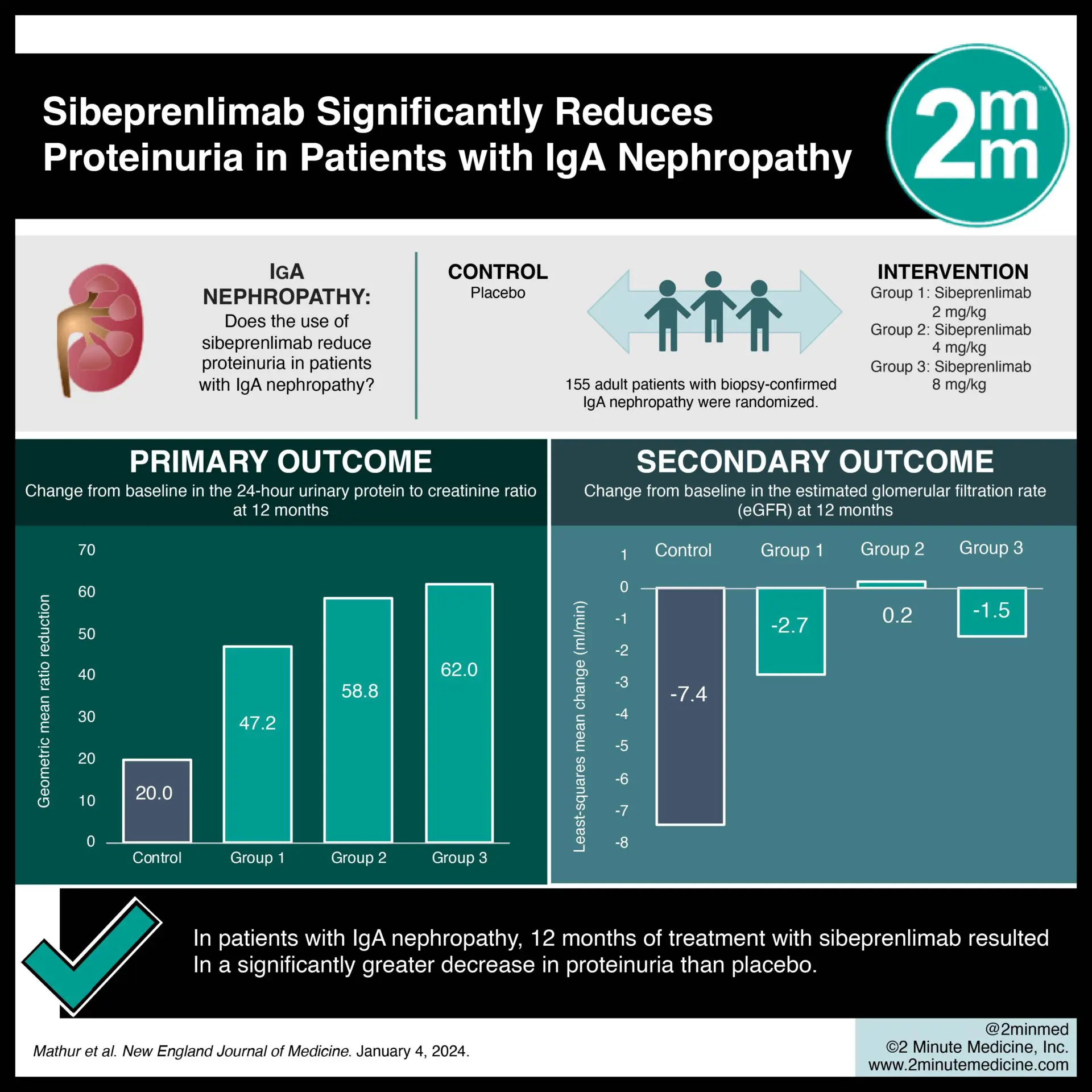In patients with IgA nephropathy, 12 months of treatment with sibeprenlimab, a humanized IgG2 monoclonal antibody, resulted in a significantly greater decrease in proteinuria than placebo.
Background
A proliferation-inducing ligand (APRIL) is implicated in the pathogenesis of IgA nephropathy. Sibeprenlimab is a humanized IgG2 monoclonal antibody that binds to and neutralizes APRIL.
Methods
In this phase 2, multicenter, double-blind, randomized, placebo-controlled, parallel-group trial, we randomly assigned adults with biopsy-confirmed IgA nephropathy who were at high risk for disease progression, despite having received standard-care treatment, in a 1:1:1:1 ratio to receive intravenous sibeprenlimab at a dose of 2, 4, or 8 mg per kilogram of body weight or placebo once monthly for 12 months. The primary end point was the change from baseline in the log-transformed 24-hour urinary protein-to-creatinine ratio at month 12. Secondary end points included the change from baseline in the estimated glomerular filtration rate (eGFR) at month 12. Safety was also assessed.
Results
Among 155 patients who underwent randomization, 38 received sibeprenlimab at a dose of 2 mg per kilogram, 41 received sibeprenlimab at a dose of 4 mg per kilogram, 38 received sibeprenlimab at a dose of 8 mg per kilogram, and 38 received placebo. At 12 months, the geometric mean ratio reduction (±SE) from baseline in the 24-hour urinary protein-to-creatinine ratio was 47.2±8.2%, 58.8±6.1%, 62.0±5.7%, and 20.0±12.6% in the sibeprenlimab 2-mg, 4-mg, and 8-mg groups and the placebo group, respectively. At 12 months, the least-squares mean (±SE) change from baseline in eGFR was −2.7±1.8, 0.2±1.7, −1.5±1.8, and −7.4±1.8 ml per minute per 1.73 m2 in the sibeprenlimab 2-mg, 4-mg, and 8-mg groups and the placebo group, respectively. The incidence of adverse events that occurred after the start of administration of sibeprenlimab or placebo was 78.6% in the pooled sibeprenlimab groups and 71.1% in the placebo group.
Conclusions
In patients with IgA nephropathy, 12 months of treatment with sibeprenlimab resulted in a significantly greater decrease in proteinuria than placebo. (Funded by Visterra; ENVISION ClinicalTrials.gov number, NCT04287985. opens in new tab; EudraCT number, 2019-002531-29. opens in new tab.)
Click here to read this study in NEJM.
©2024 2 Minute Medicine, Inc. All rights reserved. No works may be reproduced without expressed written consent from 2 Minute Medicine, Inc. Inquire about licensing here. No article should be construed as medical advice and is not intended as such by the authors or by 2 Minute Medicine, Inc.














